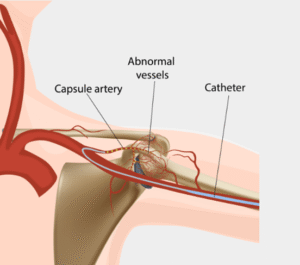What Is Frozen Shoulder?
Frozen shoulder, medically called adhesive capsulitis, is a painful and debilitating condition where the shoulder joint capsule becomes inflamed, thickened, and contracted, severely limiting movement. It typically progresses in three phases freezing, frozen, and thawing and may last months or even years.
Common symptoms include:
- Persistent shoulder pain, especially at night
- Loss of range of motion (difficulty lifting, reaching, or rotating the arm)
- Pain with basic tasks like dressing or reaching overhead
- Stiffness that doesn’t improve with time
Frozen shoulder is more common in women aged 40–65 and is often seen after trauma, surgery, or without a clear trigger.

Traditional Treatment Options from Orthopedics and Physical Therapy
Patients are usually offered the following:
- Physical Therapy
- Stretching exercises and range-of-motion training
- Most helpful in later stages, but often limited by pain
- Corticosteroid Injections
- Reduce inflammation temporarily
- May allow improved mobility for a few weeks
- Effect often fades, and repeat injections may lose potency
- Surgical Options
- Manipulation under anesthesia (MUA)
- Arthroscopic capsular release
- Require anesthesia, hospital stay, and significant recovery time
For patients who don’t respond to therapy or want to avoid surgery, Vascular Clinic offers a cutting-edge, nonsurgical alternative.
How We Treat Frozen Shoulder at Vascular Clinic
Transarterial Embolization for Adhesive Capsulitis
Transarterial Embolization (TAE) is a minimally invasive outpatient procedure that treats chronic inflammation in the shoulder joint by reducing abnormal blood flow to inflamed tissue. Think of it as shutting off fuel to a fire—limiting blood flow helps reduce inflammation and relieve pain
How the Procedure Works:
- Performed under local anesthesia and mild sedation (no general anesthesia required)
- A catheter is inserted through a small artery in the wrist or groin
- Under live X-ray, the catheter is guided to branches of the subclavian and axillary arteries
- Microscopic particles are injected to block abnormal “neovessels” feeding inflamed tissue
- Only abnormal inflamed vessels are targeted—normal shoulder function is preserved


What to Expect After Embolization
- Procedure takes about 1 hour
- Go home same day with a small bandage over the puncture site
- Most patients resume light activities within 24 hours
- No incisions, no sutures, no crutches or physical limitations
Pain relief is gradual:
- Many patients notice improvements within 2–3 weeks
- Continued recovery over 1–3 months, with return of shoulder motion and improved sleep
Results and Safety
- 80–85% of patients experience meaningful pain relief and improved range of motion
- Pain scores often drop from 8/10 to 3/10 or less
- Side effects are rare and mild: brief soreness, warmth, or low-grade fever for 1–2 days (post-embolization syndrome)
- No significant complications reported in large studies or our experience
Frequently Asked Questions
Does embolization cure frozen shoulder?
While it doesn’t “cure” the underlying capsular thickening, embolization reduces inflammation and pain, giving patients a chance to move more freely and participate in therapy often accelerating recovery.
Is this a replacement for surgery?
For many, yes. It’s a low-risk, outpatient option that can eliminate the need for surgery. And if surgery is ever needed later, embolization doesn’t prevent it.
Will I still need therapy after?
Yes. We strongly encourage stretching and physical therapy once pain is reduced—embolization creates the window for therapy to be more effective.
Is this covered by insurance?
Coverage varies. Our staff helps verify benefits and discusses financial options if needed.
Why Choose Vascular Clinic?
- Board-Certified Interventional Specialists with expertise in musculoskeletal embolization
- High-resolution imaging for accurate, targeted embolization
- No surgery, no general anesthesia, no hospital stay
- Multidisciplinary collaboration with physical therapists and orthopedic providers
- Supportive, compassionate care from start to finish
We understand how frustrating and draining frozen shoulder can be. Whether you’ve struggled with pain for months or have plateaued in therapy, our team is here to offer a new path forward gently and effectively.




